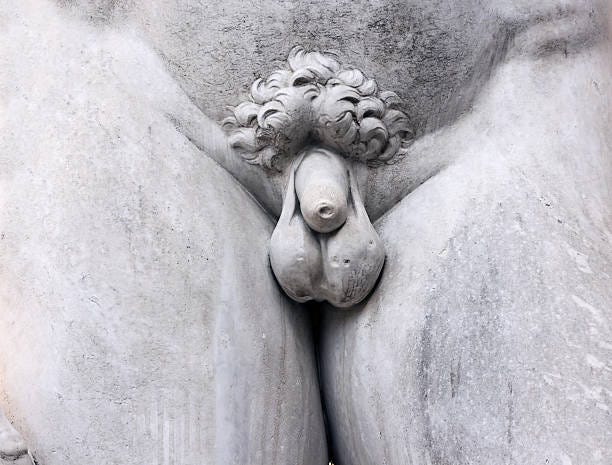The elephant walk is a name for an American fraternal hazing ritual.
As described in Jane Ward’s “Not Gay: Sex between Straight White Man”, the ritual goes like this:
Participants in the elephant walk were required to strip naked and stand in a circular formation, with one thumb in their mouth and the other in the anus of the young, typically white, man in front.
The Elephant Walk can also name the standard career progression of a contemporary Republican politician: get elected by denouncing the “swamp” in Washington, go to Washington, go join the swamp. Obviously the contemporary Democrat must decry systemic and institutional evils, like racism, inequality, and war, and then proceed to leadership of those institutions. Both Elephant Walks use shame to bond-together an ingroup; a ritual of shared degradation becomes the basis of an ennobling fraternal pack. For the Frat Boys, the shameful event comes only once (or is at least delimited to pledging), but the contemporary Republican politician’s whole career is a degradation. They drown in the swamp they promised to drain.
How the Elephant Walk looks depends on your angle. To look it from the inside is to see your brother's asshole--the same as yours, just as stinky. To hold their genitals in your hand, and feel their pulse in their most delicate parts. To bond with them at the most base of human levels. From the inside, the ritual works. From the outside, it’s humiliation, pathology, toxic masculinity. It’s just “weird.” and it might be a “little gay.”
Cawthorn is the crux of the matter, exploring how a nominally Christian society in its identitarian streak has become fixatedly nonChristian.
By rejecting personal shame in the mold of 'the personal is political' we're seeing him recast civic life and personal life away from that mold.
He is casting away the implied congruence of his beliefs, personal actions, motivations, and goals -In fact, he is also espousing a return of a radically Christian belief structure, where the enemy is the power of states, the wealthy, the powerful itself:
"For our struggle is not against flesh and blood, but against the rulers, against the authorities, against the powers of this dark world and against the spiritual forces of evil in the heavenly realms."
This is the vitalist Christian tradition, masculine, Hellenic, and focused on power, charisma, virtu as signs of favor instead of deeds or being sin-free.
A break from American's Puritan heritage in a way, in line with Romantic traditions in spiritual and intellectual life. -By defining these beliefs and actions against the shadowy elite, the cocaine orgies are in fact pedo orgies, regardless of reality.
What we start coming across now is the reality of the elephant walk. The elephant walk is the practice of being led in a march, bent over, hands on each other's dicks, being dragged along by the balls. This elephant walk is the practice of establishment politics, the fraternity practice of gathering dirt on the others to keep each other in line via shaming and blackmail
This act is 'gay' but the act of Cawthorn trying to wake up his friend by wagging his dick around him and moaning is not. Consensual drug fueled orgies are immoral, forcible touching and insulting women are at worst morally neutral. This is a worldview of contradiction, with deep historical roots and many echoes in history.
The night of the long knives comes to mind, or Soviet reaction against homosexuality under Stalin. The 'gay half' of a politically revolutionary, conspiratorial club being murdered by the other. These echoes stem back to a concept of identity vs nonidentity with action.
In modernity, homosexuality is a 'sexual identity' that is, to define the self and practice living with this as a constant frame of reference and circle around action.
In ancient times, these acts were considered in categories moral/immoral, just/unjust, ennobling/debasing. In fact, action and identity were kept separate, as the spirit was held separate from the flesh.
The Christian vitalist tradition then, is a repudiation of the concept of identity as being unchristian, as unrelated to the spiritual heritage of Christianity. If man is sinful, they sin, but in redemption there is freedom from sin, yet perhaps not its absence.
But, the Christian vitalist ethos offers a powerful way, one commonly known to practitioners of meditation and alternative pain management.
Nonidentification.
This nonidentification is in fact the dissociation of the spirit from the body, and it is this recurring trend in history, politics, and spirituality. It's see in the maxim hate the sin, not the sinner. It's seen in reactionary and radical revolutionary political movements alike.
And nonidentification with the 'sin' as it were grants tremendous power.
When an act can be seen alongside lines of ennobling or debasing, the value of identification with action decreases tremendously, and becomes punishable. To identify with debasing acts is to become constitutively less noble. This is a fundamental principle of sexuality in the classical world, and fundamental to the very idea of sin. The Christian, though they sin, do not identify with sin. There is a shared identity in Christ that can redeem and ultimately ennoble any act: “There is neither Jew nor Gentile, neither slave nor free, nor is there male and female, for you are all one in Christ Jesus.”








